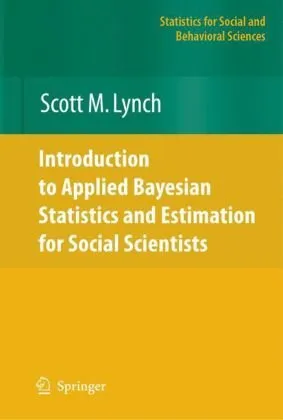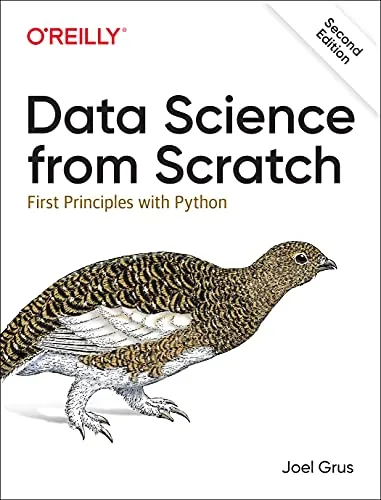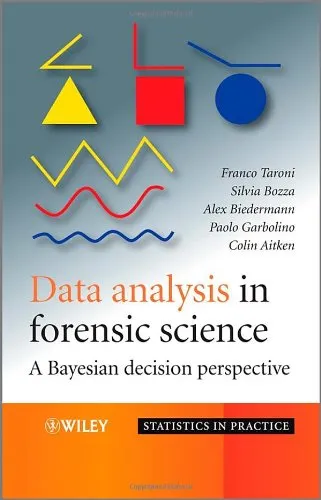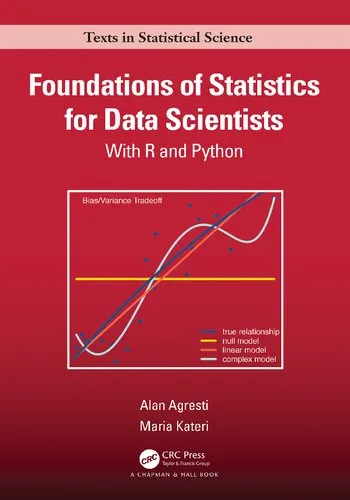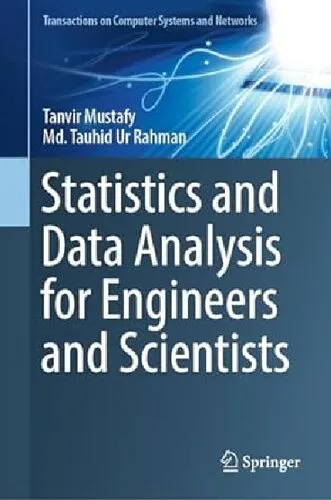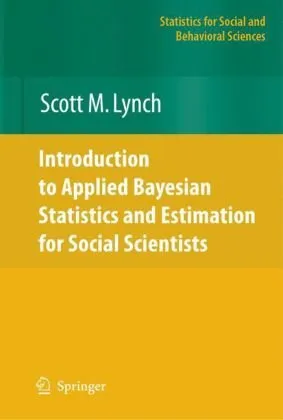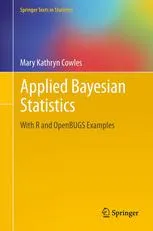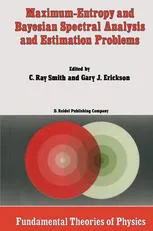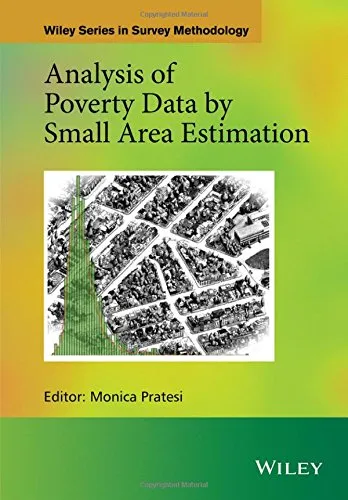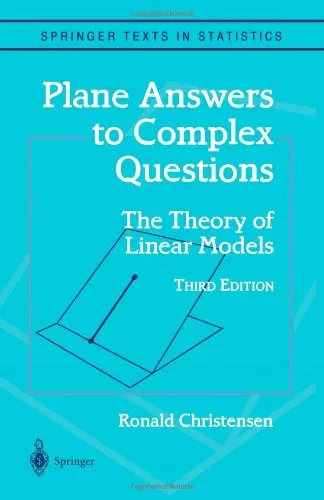Introduction to Applied Bayesian Statistics and Estimation for Social Scientists
4.7
بر اساس نظر کاربران

شما میتونید سوالاتتون در باره کتاب رو از هوش مصنوعیش بعد از ورود بپرسید
هر دانلود یا پرسش از هوش مصنوعی 2 امتیاز لازم دارد، برای بدست آوردن امتیاز رایگان، به صفحه ی راهنمای امتیازات سر بزنید و یک سری کار ارزشمند انجام بدینکتاب های مرتبط:
معرفی کتاب
کتاب Introduction to Applied Bayesian Statistics and Estimation for Social Scientists اثری است که به تحلیل و کاربرد روشهای Bayesian در علوم اجتماعی میپردازد. این کتاب برای کسانی نوشته شده که به دنبال فهم عمیقتر مدلهای آماری Bayesian و استفاده اصولی از این روشها در پژوهشهای اجتماعی و علوم مربوطه هستند.
خلاصهای از کتاب
این کتاب از پایههای Bayesian Statistics آغاز میکند و بهتدریج مباحث پیچیدهتر نظیر مدلسازی و تخمین Bayesian را مورد بررسی قرار میدهد. همچنین استفاده از نرمافزارهای آماری چون R توضیح داده شده است تا خوانندگان علاوه بر درک تئوریها، بتوانند در عمل نیز از این روشها بهرهمند شوند. در بخشهای ابتدایی، مفاهیم اصلی مانند تفاوت بین Frequentist و Bayesian روشها شرح داده شده و سپس ساختارهای پیشین (priors)، توزیع posterior، و مدلهای Hierarchical بررسی میشوند.
یکی از ویژگیهای برجسته این کتاب، تأکید بر کاربرد عملی است. مثالهای واقعی از پژوهشهای اجتماعی بهطور مداوم ارائه شدهاند تا نشان دهند چگونه Bayesian methods میتوانند مسائل دنیای واقعی را مدلسازی کرده و حل کنند. علاوه بر آن، مباحث گستردهای در مورد تشریح مدلها برای دادههای زمانبندیشده، مقاطع مقطعی و دادههای پیچیده گنجانده شده است.
نکات کلیدی
- توضیحات کامل در مورد اصول پایه Bayesian Statistics
- تمرینهای عملی برای درک بهتر مفاهیم
- آموزش استفاده از نرمافزار R در مدلسازی Bayesian
- کاربردهای گسترده در تحلیل دادههای علوم اجتماعی
- نمایش گام به گام پروژههای کاربردی
جملات معروف از کتاب
"The power of Bayesian analysis lies not in any mystical ability to generate 'better' answers, but in its capacity to integrate prior knowledge with observed data."
"Posterior distributions reflect all the evidence available: priors combined with data in a coherent manner."
چرا این کتاب مهم است؟
با مطالعه این کتاب، پژوهشگران میتوانند به ابزارهایی مجهز شوند که نه تنها تحلیلهای آنان را قدرتمندتر میکند بلکه باعث میشود بینشهای دقیقتر و نزدیک به واقعیت از دادههای خود استخراج کنند.
Introduction to Applied Bayesian Statistics and Estimation for Social Scientists
Bayesian statistics has gained immense popularity in recent years for its ability to model uncertainty, incorporate prior information, and provide intuitive analysis results. In "Introduction to Applied Bayesian Statistics and Estimation for Social Scientists", Scott M. Lynch bridges the gap between the theoretical foundations of Bayesian statistics and their practical applications in the social sciences. This book is a comprehensive guide designed specifically for social scientists who wish to integrate Bayesian methods into their research practices seamlessly.
Detailed Summary of the Book
The book is an approachable and detailed introduction to Bayesian methods, specifically tailored for social scientists who may not have a deep mathematical background. It begins by explaining the core principles of probability theory, which form the backbone of Bayesian statistics. Readers are introduced to the fundamental concept of Bayes’ theorem and its importance in updating beliefs based on new evidence. The author uses clear and concise language, avoiding overly technical jargon, making the book highly accessible to those outside of mathematical or statistical disciplines.
As the book progresses, practical estimation techniques are introduced, including Markov Chain Monte Carlo (MCMC) methods, Gibbs sampling, and the use of software packages like WinBUGS and R. Lynch is careful to provide concrete examples and real-world scenarios, using datasets relevant to the social sciences. These examples illustrate how Bayesian inference can be applied in areas such as political science, sociology, psychology, and public health.
Moreover, the book integrates model building techniques and discusses how to evaluate and compare models using Bayesian criteria. Readers will also learn how to handle missing data, estimate hierarchical models, and integrate prior knowledge effectively into their analyses. The practical, hands-on approach ensures that readers not only understand the theoretical underpinnings of Bayesian analysis but can also confidently apply these methods to their own research.
Key Takeaways
- An accessible introduction to Bayesian statistics, targeted at social scientists.
- Step-by-step guidance on using Bayesian methods for estimation, modeling, and decision-making.
- Hands-on examples using real-world datasets and software tools like R and WinBUGS.
- Comprehensive guidance on handling missing data, hierarchical modeling, and comparing models.
- Clarity in explaining complex topics, making it suitable for beginners and intermediates alike.
Famous Quotes from the Book
"Bayesian statistics is not just about numbers; it's about understanding uncertainty, embracing prior beliefs, and updating knowledge with evidence."
"The power of Bayesian inference lies in its simplicity and versatility—qualities that make it indispensable for modern-day social scientists."
Why This Book Matters
Bayesian methods have become increasingly relevant in the social sciences, where researchers often deal with uncertainty and complex datasets. Scott M. Lynch’s book provides a crucial resource for scholars, enabling them to navigate and effectively apply these methods in their work.
For decades, social scientists predominantly relied on frequentist statistics, which, while powerful, often struggled with issues like handling prior information or interpreting probabilities in an intuitive way. Bayesian statistics addresses these limitations, offering a coherent framework that seamlessly integrates prior beliefs and new data to generate insights. This book is instrumental in helping social scientists become proficient in these methods, making it an indispensable tool for researchers seeking to stay at the forefront of their fields.
Furthermore, the practical examples and hands-on exercises included in the book ensure not only theoretical understanding but also application skills, which are critical for solving real-world research problems. The approachable writing style and structured layout make it an ideal starting point for graduate students, academic researchers, and even policymakers who rely on data-driven decision-making.
Conclusion
In "Introduction to Applied Bayesian Statistics and Estimation for Social Scientists," Scott M. Lynch presents a thorough yet accessible guide to Bayesian methodologies. By blending theoretical foundations with practical applications, the book equips social scientists with the tools they need to excel in their research endeavors. Its approachable style, combined with rigorous insights, ensures that this book will remain a vital resource for years to come.
دانلود رایگان مستقیم
شما میتونید سوالاتتون در باره کتاب رو از هوش مصنوعیش بعد از ورود بپرسید
دسترسی به کتابها از طریق پلتفرمهای قانونی و کتابخانههای عمومی نه تنها از حقوق نویسندگان و ناشران حمایت میکند، بلکه به پایداری فرهنگ کتابخوانی نیز کمک میرساند. پیش از دانلود، لحظهای به بررسی این گزینهها فکر کنید.
این کتاب رو در پلتفرم های دیگه ببینید
WorldCat به شما کمک میکنه تا کتاب ها رو در کتابخانه های سراسر دنیا پیدا کنید
امتیازها، نظرات تخصصی و صحبت ها درباره کتاب را در Goodreads ببینید
کتابهای کمیاب یا دست دوم را در AbeBooks پیدا کنید و بخرید
1325
بازدید4.7
امتیاز0
نظر98%
رضایتنظرات:
4.7
بر اساس 0 نظر کاربران
Questions & Answers
Ask questions about this book or help others by answering
No questions yet. Be the first to ask!
